Training Packages:
The full version of training packages as well as ad-hoc trainings can be provided by UNODC in the Islamic Republic of Iran upon request.
Drug Demand Reduction:
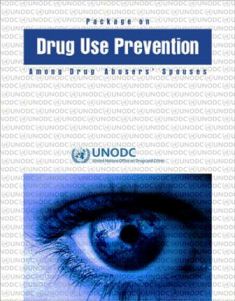 Package on "Drug & HIV/AIDS Prevention among drug abusers' Spouses"
Package on "Drug & HIV/AIDS Prevention among drug abusers' Spouses"
This package was developed for drug counsellors and educators to increase the awareness of drug abusers' spouses on drugs, HIV/AIDS and domestic violence prevention and teach them the skills to protect themselves from risk factors related to drug use. The main target group of this package are drug abusers' spouses, who suffer from stigmatization, domestic violence, lack of awareness and lack of support.This training package consists of three parts:
1- Training manual (170 pages)
2- Training workbook (57 pages)
3- Trainers Booklet (8 pages)
The training manual of the package,part one, focuses on different skills, namely life skills, self-awareness skills, positive communication skills, stress management skills and problem solving skills. On the other hand the second part of the package, the training workbook, includes some exercises which should be practiced to completely consolidate the knowledge gained.The trainers booklet of the package, part three, contains different methods to help trainers to conduct an effective and constructive workshop .This package was piloted in different settings and proved to contain the capacity to be utilized in prevention programmes throughout the whole country. Developing and distributing the package on "Drug & HIV/AIDS Prevention for drug abusers' Spouses" among its target group increased the knowledge of drug abusers' spouses on drug and domestic violence prevention.
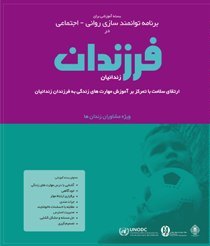 Package on "Psycho-social strengthening programme for inmates' children"
Package on "Psycho-social strengthening programme for inmates' children"
The training package intends to promote health of inmates' families and children through focusing on life skills training. It was tailored for prisoners' counsellors and it consists of two parts:
1- Training manual and trainers booklet (155 pages)
[Full text - Fa]
2- Training workbook (72 pages)
[Full text - Fa]
The training workbook of this package includes several exercises on different skills such as confronting the negative feelings, problem solving and decision making skills as well as assertiveness skills. Life skills are cognitive, emotional, interpersonal and social skills which enable individuals to deal effectively with the challenges of everyday life.The package was piloted in prison settings and encompasses the capacity to increase the knowledge of inmates' children regarding life skills, drug and violence prevention.
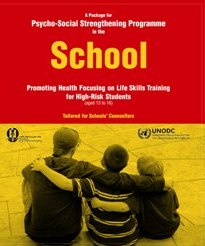 Package on "Psycho-social strengthening programme in the schools"
Package on "Psycho-social strengthening programme in the schools"
This package was tailored for school counsellors and its main target group is high risk students (aged 13-16). It includes three parts:
1- Training manual (138 pages)
2- Trainers' Booklet (158 pages)
3- Training workbook (84 pages)
Several subjects are discussed such as different theories of drug abuse in youth, risk and protective factors on drug abuse of youth, drug abuse prevention models etc. The training workbook contains exercises, providing an opportunity for youths to gain more practice on the training manual. The package strengthens the capacity of counseling services and it also increases the counsellors' knowledge about counselling for students at risk. In addition to the above mentioned purposes, the following objectives are also achieved: i) enhanced knowledge of counsellors for conducting screening to find high-risk students, ii) strengthened health and psychosocial skills in high-risk students, and iii) increased confidence and skills of school counsellors in working with high-risk students.
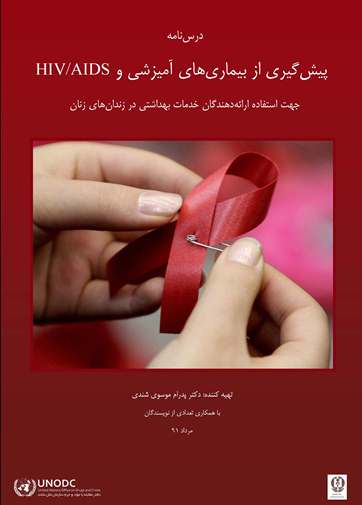 "Prevention of HIV/AIDS and Sexually Transmitted Infections" Package
"Prevention of HIV/AIDS and Sexually Transmitted Infections" Package
Atraining package entitled "Prevention of HIV/AIDS and Sexually Transmitted Infections" was developed in 2012 by UNODC Iran under the Country Programme 2011-2014. This package has been prepared for the use of medical staff and psychologists of Iranian women's prisons.
 "What Police Need to Know on HIV/AIDS" Package
"What Police Need to Know on HIV/AIDS" Package
A training package entitled "What Police Need to Know on HIV/AIDS" was developed in 2011 and published in 2012 by UNODC Iran under the Country Programme 2011-2014. The target group of this package consists of psychologists and medical staff of the Iranian Police Forces.
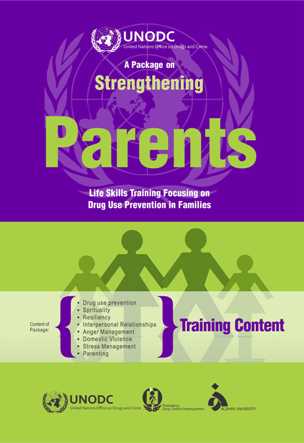 A Package on Strengthening Parents - Life Skills Training Focusing on Drug Use Prevention in Families
A Package on Strengthening Parents - Life Skills Training Focusing on Drug Use Prevention in Families
This training package was developed with the aim of increasing parents' knowledge on parenting, life and social skills, as well as drugs and drug use prevention in families. It consists of five parts:
1- Training Manual (104 pages)
2- Training Workbook (44 pages)
3- Trainers Booklet (35 pages)
4- Training CD
5- Poster
The package could be considered as home-based drug prevention education and life skills training, highlighting several themes and concepts such as: enhancement of communication and interpersonal skills, self-awareness, family bonding, parenting skills, stress management, anger management, domestic violence prevention, risk and protective factors, drug abuse and drug dependency, and the role of parents in drug prevention. .
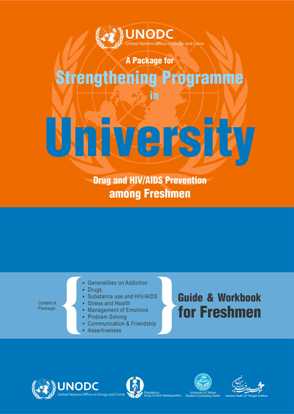 Package on Drug and HIV Prevention among University Freshmen
Package on Drug and HIV Prevention among University Freshmen
This training package was developed with the aim of strengthening drug prevention capacities in universities across the country. The main target groups of this training package are first-year students, their parents, and the counsellors working with them. It consists of five parts:
1- Training Manual (112 pages)
2- Training Workbook (80 pages)
3- Trainers Booklet (56 pages)
4- Training CD
5- Poster
The package focuses on several themes and concepts in the field of drug use and HIV/AIDS prevention such as: life skills training, family skills for parents, family approaches, coping with stressful situations, risk and protective factors, drug abuse and drug dependency, and the role of parents in drug prevention. It was officially launched during the sixth national seminar on "Mental Health of University Students", which was held on 16 and 17 May 2012 by the Ministry of Sciences, Research and Technology, in cooperation with the Drug Control Headquarters; the Ministry of Health, Treatment and Medical Education; the State Welfare Organization; and UNODC Iran. The development and distribution of the package among its target groups are increasing the knowledge, skills and confidence of counsellors and teachers on drug prevention among freshmen.
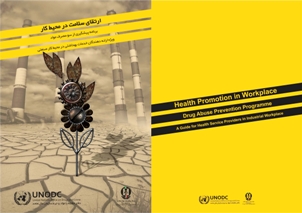
The guideline was developed for health service providers working in industrial settings with the purpose of addressing the workplace-related psychosocial hazards such as alcohol and drug abuse, stress, and violence. It aims to assist the relevant experts in the development of policy and action for addressing health promotion issues at the workplace and in finding innovative ways to deal with the consequences of the risks associated with psychosocial factors.
This 171-page guideline focuses on drug and alcohol use prevention, HIV prevention, the Employee Assistance Programmes (EAP), stress management, anger and violence management, as well as different social skills like effective communication, assertiveness, and respect for others. It has been piloted in two different industrial settings, enhancing the knowledge and skills of the target group in these locations.
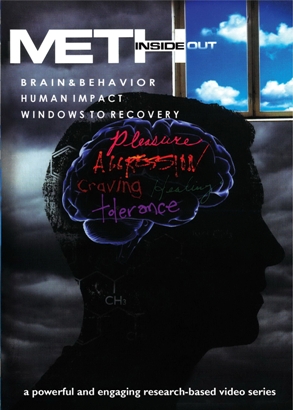
"Meth Inside Out" is a groundbreaking video-based prevention and treatment curriculum on methamphetamine addiction and recovery. The series is designed to equip meth users, their families, and the professionals who assist them (including psychologists, psychiatrists, physicians, drug counsellors, social workers, nurses, drug therapists, drug prevention practitioners, as well as drug prevention educators) with a solid understanding of the biological basis of addiction, effective tools for recovery, and most importantly, hope for the future. This research-based series presents the most up-to-date information in a compelling and easy-to-understand format. "Meth Inside Out" emphasizes the human impact of drug use by sharing personal stories of drug users and their families.
Created for maximum flexibility, the curriculum is designed to meet the needs of treatment centres, correctional facilities, community centres, social service agencies, and universities. The series is composed of 3 episodes entitled: i) Human Impact, ii) Brain and Behavior and iii) Windows to Recovery, which can be used individually or as a set, as well as an educational brochure.
"Meth Inside Out" was presented by UCLA Integrated Substance Abuse Programmes, a leading research institution on the topic of methamphetamine, and the Eyes of the World Media Group, the copyright owner of the video set. UNODC Iran contacted the Eyes of the World Media Group and received the permission for the subtitling and reproduction of the set, with the aim of increasing the knowledge of Iranian drug demand reduction service providers in the field of ATS abuse prevention, treatment, and rehabilitation.
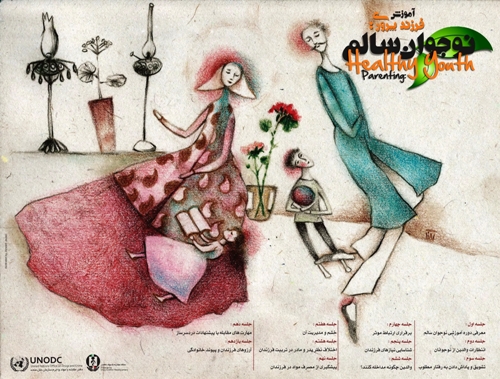
"Healthy Youth" is an audio-visual (A/V) training package produced for parents of children 10 to 13 years of age, providing life skills training for adolescents and their parents.
The A/V package is 250 minutes long and contains a poster and two DVDs which include eleven sessions on different life, social and parenting skills, such as anger management, effective communication, and encouragement and rewarding. The package focuses on family relationships and communication, family management skills, and resolution of family conflicts. It helps parents address risks that can contribute to adolescent drug abuse while strengthening family bonding by building protective factors.
The A/V life skills training contributes to the development of attitudes and values that promote respect for oneself and for others, tolerance of individual differences, and peaceful co-existence. It also contributes to the adoption of health-promoting habits, and reduces risk-taking behaviours associated with drug and alcohol abuse, HIV/STI infection, and violence.


